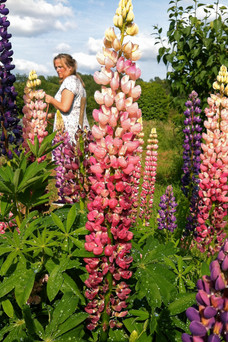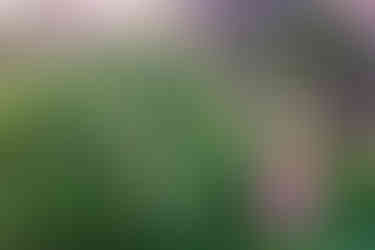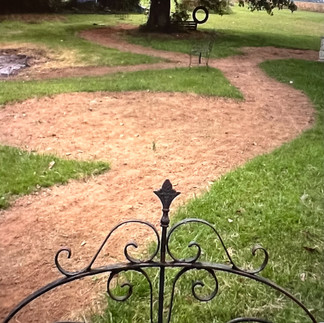Updated: May 1, 2022

What is a garden? My mother and grandmothers grew flowers but never referred to them as a garden. They called them flowerbeds. I grew up thinking of a garden as just a place to grow food, a vegetable garden. I can still see my paternal grandmother, Margerite, bent over in her garden, picking vegetables then placing them in her upturned apron.

I remember sitting with her in metal chairs in the front yard, shelling “shelly” beans. I will never forget the delicious meals she prepared from the food she grew for us to eat on all year long. “Garden to table” before it was a hashtag.
It wasn’t until my trip to France that I learned that when the French speak of a garden, they are probably referring to an outdoor living space that would more likely contains flowers than vegetables. The French don’t have the perfectly manicured and weedless green lawns that we Americans strive for. Their yards seem to have a planned casualness about them. Bushes are planted willy-nilly throughout the yard. Patches of flowers are planted here and there, not contained within a mulched bed. Flowers and bushes alike grow in the middle of gravel paths and into them. Mismatched pots of vibrant colored flowers are scattered everywhere. Doorways are often rose-draped.

My maternal grandmother, Gladys, would have loved that. She grew climbing roses and always had a bottle of rose-scented eau de toilette on her dresser.
When the French plant a vegetable garden, it often contains a scattering of flowers throughout. My friend and neighbor in France, Monique, let me help her plant her vegetable garden, which we fit into her existing flower garden. I counted it a privilege when she asked me to keep it watered for her while she and her husband, Jean Louis, were away to Italy for a couple of weeks. Monique’s garden was the inspiration for my own.
As soon as I was back home, I set about designing my French-inspired garden, keeping in mind casualness and low maintenance. Once I had settled on the design, I sketched it all out on a large chalkboard, which I still have hanging in my bedroom as a reminder to finish the garden as designed. Then the real work began. It has taken several years and is nearly complete. I had many helpers along the way, but have worked on each and every inch of ground.
“How fair is a garden amid the toils and passions of existence.” Benjamin Disraeli
That certainly holds true for me. My garden is the place I go to when something is troubling me. It is the place I literally ran to when I heard about the sudden death of a friend. It is the place I have raised my voice to the heavens, asking, “Why?” on more than one occasion. But it is also the place where I thank God, the place where I praise Him in song, however off-key. It is where I petition Him or ask for forgiveness while pulling weeds. Symbolic, yes? And always, after working in the garden, I sit in my porch-style garden swing which is hung from an 18’ tall branch, making it glide more than swing upward. As I glide, I close my eyes and listen for Him. Often there is a sudden and strong wind that blows through and I take that as a sign that He is with me, literally there with me.

“One is nearer God’s heart in a garden than anywhere else on earth.” Dorothy Gurney
My garden is also my place of refuge from the modern world, a place where I can disconnect from my phone and my schedule, a place to unwind, to daydream, or just to zone out. I recall one Sunday after church, during a particularly stressful time in my life, that I sat out in that swing for the entire afternoon. What I can’t recall is one single thing I thought about during those hours. I just sat there enjoying the view, the breeze and the sunshine. Many evenings I am out in the garden late, not realizing the hour until I try to walk back to the house, finding it too dark to see. Often, my husband will ask, “Where have you been?”. Silly question.

“Castle or Farmhouse, it is the garden that makes it feel like home.” Unknown author
I grew up in a very old farmhouse. My mother did her best to make it a nice home for her family. She built and installed a window box under the window beside our kitchen table so that we could enjoy her flowers up close while we ate. She also planted a line of gladiolus along a dilapidated shed that was in view of that window to pretty it up. She loved to photograph her flowers, zooming in close to show the intricacy of the patterns and colors. She would sometimes capture a tiny insect living his best life on that beautiful flower.
Gen 2:8 Now the Lord God had planted a garden in the East in Eden and there He put the man He had formed.”
Adam belonged in a garden and apparently, I do, too. My three-year-old grandson once said, “Grandma, let’s go to your garden. You belong there.”
I agree, Isaiah, I agree.
Updated: Apr 18, 2022

Hardly. My given name is Reneau, spelled in the original French. I have traced my genealogy all the way back to 1600 Bordeaux. However, it has been over 330 years since my ancestors unwillingly left France, as Huguenots, fleeing first to London then travelling thirteen weeks by sea, settling eventually in Virginia.

My family has been in America since 1688, nearly a hundred years before it even became a country. So that would make me wholly American, right? Of course, it does.
Then why is it that I feel such a yearning, a literal pull toward all things French? What could explain the tear-inducing sadness that I’ve felt on more than one occasion upon seeing a picture of an ancient French homestead? Why is it that I’m drawn almost exclusively to antique French décor?
It isn’t only French things that capture my attention. It's more about French ways. I recently read the statement by a French language professor, “The American way is to live in the 'faire' (to do) or in the 'avoir' (to have), but the French live in the 'etre' (to be)." Don’t get me wrong. I am a good American in that way. I make lists. I love to cross things off those lists. But I am most content when the list is emptied, and I am able to just “be”.
My perfect day would be spent at home, a pot stew on the stove, cooked in red wine, the aroma meandering through the house. No television. No electric lighting. No artificial sounds, just the wind or rain or simply the birds singing their happy tunes. Most importantly, that perfect day would include time. Time to create, whether that be painting, writing or designing a garden. Time to soak in the bathtub and just daydream. Time to turn on the music of Rufus Wainwright, Laura Fabian or Edith Piaf and dance in the kitchen. Time to hang out with my adult children. Time to play like a kid with my grandchildren, unencumbered by the clock or a phone or the pressures of the world. Time to go antiquing with my best friend. Time to play cards with my parents and sisters, laughing with abandon. Time to sit in the dark and watch an old movie with my husband. Time to live full on. Time to be, to just be, (etre).
I believe that we Americans might just live a little too comfortably. We say, “we’re starving” if we’re the slightest bit hungry. We say, “we’re freezing” or “we’re burning up” if we are just a couple of degrees off perfectly comfortable. I have always loved to feel the warmth of the sunshine and the coolness of the wind. The combination of the two are my favorite. Don’t misunderstand, I appreciate having heat and air conditioning during extreme seasons but feel it’s okay to not live in a consistent temperature at all times. In fact, I prefer it.
During my trip to France, I stayed in a four-hundred-year-old house with no heat or air conditioning, just a warm breeze blowing through the opened windows during the day. In the evenings, it became quite cold. Snuggling under the piled-high blankets made it more real, more memorable, more wonderful.
The French believe it is okay to feel things; hot and cold, joy and sorrow, pain and release. My oldest daughter once told me that she wanted to fully experience childbirth. She wanted to go into labor naturally. She didn’t want pain medication. She wanted to deliver her baby the old-fashioned way. It made the birth of her child more exhilarating, more real. She said, “The greater the pain, the greater the relief, how much more magical the birth.” I wish I had done that. She has a little French in her, too.
While I was in France, I saw the French take time to celebrate every meal. There is a mandatory two-hour break when all business close for lunch, except restaurants, of course. When one makes a dinner reservation, the table is reserved for the entire evening. No one rushes meals in France. And neither do I. My husband, on the other hand, consumes his meal before I get myself situated. It isn’t a problem when we eat at home but is very frustrating when we eat out. My pet peeve is when the waiter takes my husband's empty plate, leaving me to appear to be the only one eating dinner. This would never happen in France.
So, what could explain my similarities, my connection to all things French? My husband was the first to explain it. He had watched his wife of over forty years, me, moi, slowly peeling off the layers of American culture, eventually revealing her French self. I’ll never forget the day he said these profound words to me. “Of course, you’re French. It is literally in your blood.”
My ancestors were forced to leave their homeland. I'm sure they wished they were able to return. Maybe that is why I feel a pull to be there. As crazy as it sounds, could it be that one day we will discover more about our DNA and the marvelous, God-created things that could be hidden therein?
I may never know for certain during this lifetime, but I am content just knowing, “It’s in my blood”.


























